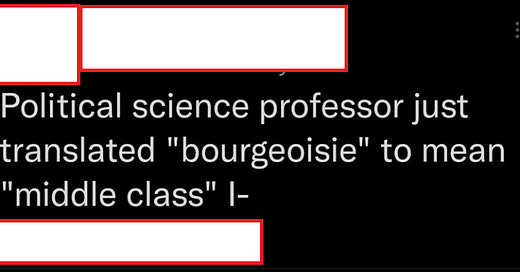The professor in this tweet is correct in a sense. Although we on the left are right to be wary of language usage it’s still dangerous to ignore etymology.
“Bourgeois” isn’t just a CIA psyop to engineer a word with such difficult spelling it stymies the left for generations— it actually means something in an accursed language called “French”. Specifically it means a town-dweller, etymologically linked to such burgs as Pittsburgh or Hamburg or the Burghers of Calais. For hundreds of years, under an entirely different system of production, most people either toiled in the fields or sharpened their swords in a castle, either worked or prayed or fought. But then there were these town-dwellers, these rascally bourgeois who didn’t know where they stood.
The bourgeoisie were professionals and businessmen who came from peasant stock but acquired nobleman money. They were nouveau riche and perceived to have atrocious manners. They scraped obsequiously to their betters, always struggling to fit in but never quite understanding the easy carelessness of old money. Meanwhile they lorded their advantages over their lessers. No one is as miserly as those who have lived without. Their lives became centered around the accounting and recounting of cash, they had all the trappings of wealth but still had to work for it. Old money understood that luxuries were theirs by right and old poverty understood it wasn’t, but the bourgeoisie would stoop so low as to ask the price of something. Revoltingly déclassée.
Through the early modern era and well into the 19th century this was the understood definition of bourgeois: grasping, materialistic, insecure. When Marx, a poet as much as a theorist, identified dialectical conflict within economic systems he could have called the dominant class under capitalism anything at all. Philosophers are given a lot of leeway to name their conceptions so long as it gets the point across; Freud is more famous than Lacan because the former named his id with a monosyllabic grunt while the latter quibbled with whether or not to capitalize the “O” in “other.” Marx chose “bourgeoisie” because of its existing connotations.
“All that is solid melts into air” says Marx of people’s relations to each other under capitalism. Our owners used to justify themselves with God or their own sword, now it’s just because of numbers in a spreadsheet. Your masters are not kings or emperors, says Marx. They are bankers and businessmen. They are bourgeois.




